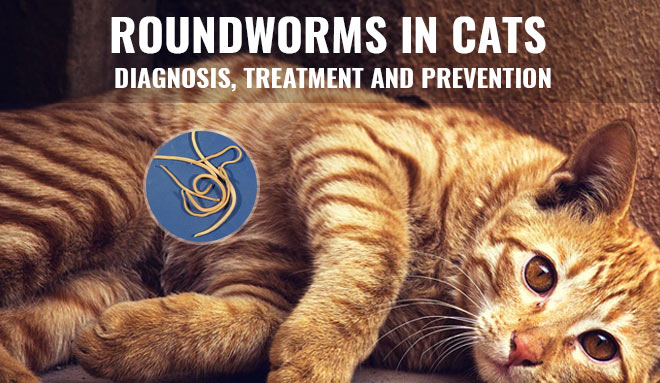As a caring and vigilant cat parent, your top priority is keeping your feline friend healthy and free from harmful parasites. While fleas and ticks are easier to spot, intestinal parasites such as roundworms in cats often go unnoticed until they cause serious health problems.
Roundworms are one of the most common intestinal parasites in cats. They live inside the digestive system, feeding on nutrients meant for your cat and potentially leading to malnutrition, weakness, and even more severe complications. What’s more, roundworms are not just a threat to cats—they can also affect humans, making prevention and treatment essential.
In this guide, we’ll cover everything you need to know about roundworms in cats, including symptoms, diagnosis, treatment options, and preventive measures to keep your kitty healthy and safe.
What Are Roundworms in Cats?
Roundworms are long, spaghetti-like intestinal parasites that live inside a cat’s digestive tract. They are usually 3–6 inches long and white or light brown in color. A cat can carry dozens of these worms in its intestines, which not only affects digestion but can also put a strain on overall health.
The two main species of roundworms that infect cats are:
- Toxocara cati – the most common type, which can also cause health problems in humans.
- Toxascaris leonina – less common but can infect both cats and dogs.
Roundworms reproduce by laying eggs inside a cat’s intestines. These eggs are excreted in the stool and can survive in the environment for months, posing a risk of reinfection or transmission to other animals and humans.
How Do Cats Get Roundworms?
Cats can become infected with roundworms in several ways:
- Mother to kittens: Larvae can pass through the placenta or through the mother’s milk to kittens.
- Ingesting eggs: Cats may ingest roundworm eggs from contaminated soil, food, or feces.
- Hunting prey: Rodents, cockroaches, earthworms, and birds can act as carriers (paratenic hosts).
- Poor hygiene: Dirty litter boxes or unclean environments increase the risk of infection.
Symptoms of Roundworms in Cats
Many cats show no early signs of roundworm infection, which makes it harder to detect. However, as the infestation grows, symptoms may include:
- Vomiting (sometimes containing worms)
- Diarrhea
- Loss of appetite
- Weight loss despite eating well
- Weakness and lethargy
- Swollen or potbelly appearance, especially in kittens
- Poor coat condition
- Abdominal discomfort
If untreated, severe infestations can cause intestinal blockages, which may be life-threatening.
Diagnosis of Roundworms in Cats
Roundworms are usually diagnosed through a fecal examination. A small sample of your cat’s stool is mixed with a solution, and under a microscope, roundworm eggs can be identified.
In some cases, worms may be visible in vomit or stool, but even if you don’t see them, a vet checkup is necessary if your cat shows any of the above symptoms.
Treatment for Roundworms in Cats
The good news is that roundworms in cats are highly treatable. Veterinarians typically prescribe safe and effective deworming medications, available in tablet, liquid, or paste form.
Some common vet-recommended dewormers include:
Important points about treatment:
- Most dewormers kill adult worms but not larvae, so multiple treatments are necessary.
- Kittens should be dewormed every 2 weeks until 12 weeks of age.
- Adult cats should be dewormed at least once every 3 months.
- Always consult your veterinarian for the correct product and dosage.
Prevention of Roundworms in Cats
Preventing roundworms is just as important as treating them. Here are some effective preventive measures:
- Deworming schedule – Regularly deworm kittens, adult cats, and especially pregnant or lactating cats.
- Hygiene – Clean the litter box daily, preferably with bleach, and always wash your hands afterward.
- Control hunting – Keep cats indoors and away from rodents, insects, and birds that may carry larvae.
- Routine vet visits – Regular checkups help detect and address parasite issues early.
- Clean environment – A hygienic home reduces the chance of reinfection.
Can Humans Get Roundworms from Cats?
Yes. The larvae of Toxocara cati can infect humans, particularly children, through accidental ingestion of contaminated soil, litter, or feces. This can cause a condition known as visceral larva migrans, where larvae migrate to organs, and in rare cases, ocular larva migrans, which affects the eyes.
This makes parasite control not only essential for your cat’s health but also for your family’s safety.
Conclusion
Roundworms in cats are one of the most common yet preventable parasitic infections. With regular deworming, proper hygiene, and routine vet care, you can protect your cat from the harmful effects of these intestinal parasites.
Your feline friend deserves a healthy, worm-free life. Take preventive measures today to ensure their long-term well-being and keep your household safe.
FAQs
1. What are roundworms in cats?
Roundworms are intestinal parasites that live inside a cat’s digestive system, feeding on nutrients and causing weakness, poor health, and discomfort.
2. How do I know if my cat has roundworms?
Common symptoms include vomiting, diarrhea, loss of appetite, potbelly appearance, weakness, and poor coat health. A stool test at the vet confirms diagnosis.
3. Can roundworms in cats infect humans?
Yes. Toxocara cati larvae can migrate in humans and cause health issues. Good hygiene and timely deworming reduce the risk.
4. What is the best treatment for roundworms in cats?
Vet-recommended dewormers such as Mediworm, Triworm-C, or Antezole are effective. Regular treatments are required to eliminate both adult worms and larvae.
5. How often should I deworm my cat?
Kittens should be dewormed every 2 weeks until 12 weeks of age, while adult cats should be dewormed at least every 3 months.
6. How can I prevent roundworm infections in my cat?
Maintain proper hygiene, clean litter boxes daily, keep your cat indoors, prevent hunting rodents, and use regular deworming as advised by your vet.

